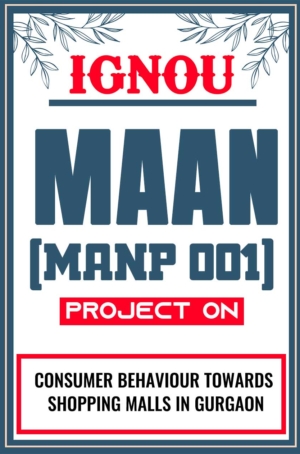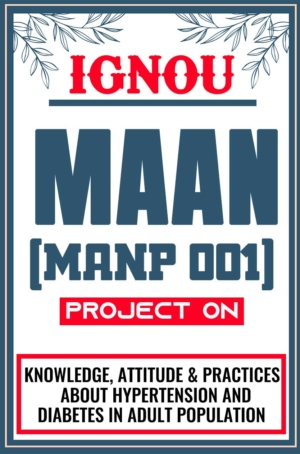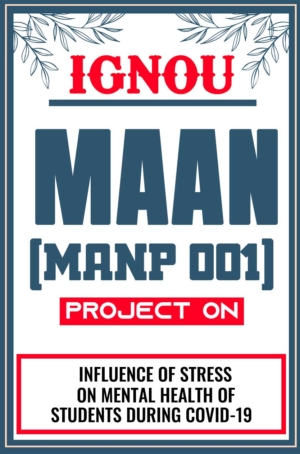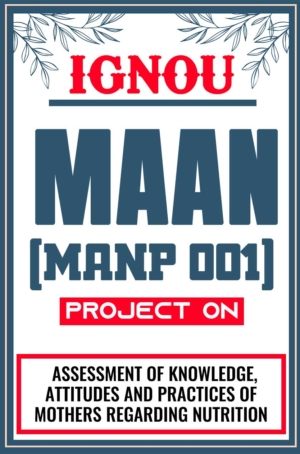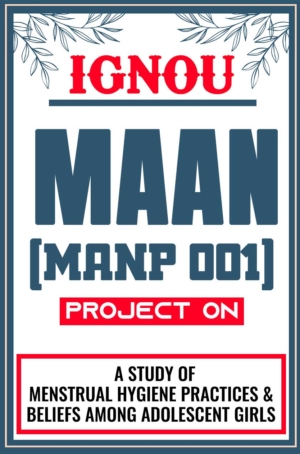Buy IGNOU MAAN Project for MANP 1, MANI 1, MANI 3
Anthropology is the study of human beings in time and space. The IGNOU MAAN Project is based on integrated approach to the subject incorporating insights from physical, social and archaeological anthropology. The thrust is laid on an in-depth understanding involving holistic approach of Anthropology using theoretical and practical techniques. The IGNOU MAAN Project is aimed at developing professional competence of the subject in light of perceivable need for trained anthropologists in academic and research institutes, NGO‘s, government organizations, health sectors and applied sciences. The focus of the IGNOU MAAN Project is to equip the learners to employ anthropological insight to understand and relate contemporary biosocial shift. It provides an opportunity to a large segment of people desirous to understand essence of the subject.
Whatsapp us to get the Personalized (Customized) IGNOU MAAN Project Report and Synopsis
Download Link for IGNOU MAAN Project (MANP 1 & MANI 1/3 PDF)
What are the key components of the IGNOU MAAN Project?
- MANP 1 (Project Work): Involves conducting original research on a specific topic related to anthropology and preparing a detailed report.
- MANI 1/3 (Internship/Fieldwork): Requires students to engage in fieldwork or an internship, apply anthropological methods, and document their experiences and findings.
What should be included in the research IGNOU MAAN Project proposal?
Components of a Research Proposal for MANP 1 Dissertation: A well-structured research proposal is crucial for the successful execution of your dissertation. Here are the essential components that should be included in your research proposal:
1. Title Page:
- Title: A concise and descriptive title of your research.
- Student Details: Name, enrollment number, course, and contact information.
- Supervisor Details: Name and contact information of your supervisor.
- Date: Date of submission.
2. Abstract:
- A brief summary of the research proposal, including the research problem, objectives, methodology, and expected outcomes. (Typically around 250-300 words)
3. Introduction:
- Background: Context and background information relevant to the research topic.
- Research Problem: Clearly state the problem or issue you intend to investigate.
- Significance: Explain the importance of the research and its potential contributions to the field of anthropology.
4. Literature Review:
- A review of existing literature related to your research topic. Identify gaps in the literature that your research aims to fill.
- Discuss previous studies, their findings, and how they relate to your research question.
5. Research Objectives:
- Clearly define the objectives of your research. What do you aim to achieve through your study?
6. Research Questions/Hypotheses:
- State the specific research questions you intend to answer or the hypotheses you plan to test.
7. Methodology:
- Research Design: Describe the overall approach and design of your research (e.g., qualitative, quantitative, mixed methods).
- Data Collection Methods: Explain how you will collect data (e.g., surveys, interviews, observations, archival research).
- Sampling: Describe your sampling strategy and the population from which you will draw your sample.
- Data Analysis: Outline the methods you will use to analyze the collected data.
8. Ethical Considerations:
- Discuss any ethical issues related to your research, including how you will ensure the confidentiality and consent of participants.
9. Timeline:
- Provide a detailed timeline for your research, including key milestones and deadlines for each phase of the project.
10. Budget (if applicable):
- Outline any anticipated costs related to your research and how you plan to cover these expenses.
11. Expected Outcomes:
- Describe the potential findings and implications of your research.
12. References:
- Include a list of all the sources cited in your proposal, formatted according to the appropriate citation style (e.g., APA, MLA).
13. Appendices (if applicable):
- Any additional materials that support your proposal, such as questionnaires, interview guides, or consent forms.
Can you modify your research topic after starting the IGNOU MAAN Project?
Yes, it is possible to modify your research topic after initiating your project, but such changes should be approached with careful consideration and formal approval. The process generally involves the following steps:
1. Consultation with Your Academic Supervisor:
- Initial Discussion: Discuss the proposed changes with your academic supervisor or project advisor. This consultation is crucial to assess the feasibility and academic value of the new topic.
- Feedback and Advice: Your supervisor will provide feedback on the implications of changing your topic, including potential impacts on your research methodology, data collection, and overall project timeline.
2. Revised Research Proposal:
- Documentation: Prepare a revised research proposal that outlines the new research topic, objectives, methodology, and any modifications to the scope of your study.
- Justification: Include a rationale for the change, detailing why the new topic is more relevant or feasible compared to the original one.
3. Approval Process:
- Formal Submission: Submit the revised proposal to the appropriate academic committee or review board for formal approval. This step ensures that the modification aligns with academic standards and program requirements.
- Documentation Requirements: Depending on your institution’s guidelines, you may need to provide additional documentation or evidence supporting the necessity of the change.
4. Impact Assessment:
- Project Plan: Evaluate how the change will affect your overall project plan, including the timeline, resource allocation, and any additional requirements for data collection or analysis.
- Ethical Considerations: Assess whether the modification introduces new ethical considerations or requires updates to any existing ethical clearance.
5. Notification and Implementation:
- Inform Relevant Parties: Once approved, inform all relevant parties, including your academic supervisor, fieldwork coordinators, and any collaborators or stakeholders involved in your research.
- Adjustments: Implement the changes according to the new research plan and ensure all project documentation reflects the updated topic.
Samples of IGNOU MAAN Project Dissertation for MANP 1 & MANI 1/3
Manp-01
- A Study of Nutritional Status Of Pre School Children
- A Study Of Nutritional Status Of Diabetic Women
- A Study Of Climate Change In India
- A Study Of Biodiversity Of Jim Corbet Ntional Park
- A Study On Smartphone Addiction, General Health And Self Esteem Of Adolescent
Mani-01
- A Study Of Menstrual Hygiene Practices And Beliefs Among Rural Adolescent Girls
- A Study Of Work Life Balance Among Working Women In Government Offices
- Astudy Of Hypertention Among People Of Xyz City
Mani-03
- A Study On The Knowledge, Attitude’s And Practices About Earthquake Preparedness
- A Study Of Consumer Behaviour Towards Shopping Malls In Xyz City
- A Study Of Violation Of Human Rights Of Women
Do you need to present your IGNOU MAAN Project report to a panel?
Whether you need to present your field report to a panel depends on the specific requirements of your IGNOU MAAN program and your study center. Generally, IGNOU requires a viva voce (oral defense) for dissertations and fieldwork reports to assess the student’s understanding and involvement in their research. Here are the typical scenarios:
Common Requirements
Viva Voce (Oral Defense):
- Mandatory: In many cases, presenting your field report or dissertation to a panel is mandatory. This involves a viva voce, where you defend your work in front of a panel of examiners.
- Purpose: The purpose is to evaluate your understanding of the subject, the methodologies used, and the conclusions drawn in your report.
- Panel Composition: The panel typically includes your supervisor and other faculty members or experts in the field.
Presentation Guidelines:
- Preparation: Be prepared to give a concise presentation summarizing your fieldwork, findings, and conclusions. Use visual aids like PowerPoint slides to support your presentation.
- Content: Highlight the key aspects of your report, including the research problem, methodology, key findings, and implications.
- Questions: Be ready to answer questions from the panel about your research process, challenges faced, and the significance of your findings.
Submission Only:
- In Some Cases: In some instances, especially for projects or smaller assignments, only submission of the written report may be required without a formal presentation.
Steps to Confirm Requirements
Consult Your Supervisor:
- Discuss with your supervisor or mentor to understand the specific requirements for your program and study center.
Check Study Center Guidelines:
- Review any guidelines or instructions provided by your study center or on the IGNOU website related to the MAAN program.
Contact Study Center:
- Contact your study center directly to confirm whether a presentation or viva voce is required for your field report.
Preparing for the Presentation
Create a Presentation:
- Prepare a PowerPoint presentation that covers the main sections of your field report.
- Keep it concise and focused, typically 10-15 slides.
Practice:
- Rehearse your presentation multiple times to ensure smooth delivery.
- Practice answering potential questions that the panel may ask.
Organize Your Materials:
- Have all necessary materials, such as your field report, raw data, and any visual aids, ready and organized.
Dress Professionally:
- Dress appropriately for the presentation to make a good impression.
Be Confident:
- Approach the presentation with confidence. Remember that the panel is interested in your work and your ability to articulate your research process and findings.
What if your internship organization asks you to perform tasks unrelated to your IGNOU MAAN Project fieldwork?
If your internship organization asks you to perform tasks unrelated to your fieldwork, it is important to address the situation professionally and diplomatically. Here are some steps you can take:
Steps to Address Unrelated Tasks During Your Internship
Evaluate the Tasks:
- Assess whether the unrelated tasks can still provide valuable skills or experiences. Sometimes, tasks outside your immediate research focus can offer useful learning opportunities.
Discuss with Your Supervisor:
- Schedule a meeting with your internship supervisor to discuss your concerns. Clearly explain your research objectives and how the unrelated tasks are affecting your ability to achieve those goals.
Refer to Your Internship Agreement:
- If you have an internship agreement or a set of outlined responsibilities, refer to it during your discussion. This document can serve as a basis for your argument.
Seek Guidance from Your Academic Supervisor:
- Inform your academic supervisor or advisor at IGNOU about the situation. They can provide advice on how to handle the issue and may intervene on your behalf if necessary.
Propose a Compromise:
- Suggest a compromise where you balance the unrelated tasks with your fieldwork responsibilities. Propose a schedule that allows you to fulfill both sets of duties without compromising your research.
Document Your Tasks:
- Keep a detailed log of all tasks assigned to you, including those unrelated to your fieldwork. This documentation can be useful if you need to provide evidence of your workload and responsibilities.
Focus on Communication:
- Maintain open and respectful communication with your internship supervisor. Clearly articulate your commitment to contributing to the organization while also fulfilling your academic requirements.
How do you find an internship placement for IGNOU MAAN Project (MANI 1/3)?
Finding an internship placement for the MANI 1/3 component of the IGNOU MAAN program involves several steps to ensure you secure a position that aligns with your fieldwork requirements and academic goals. Here’s a detailed guide to help you with the process:
Steps to Find an Internship Placement
1. Identify Your Interests and Goals:
- Determine the specific areas of anthropology you are interested in, such as cultural anthropology, social anthropology, or archaeological anthropology. This will help you target organizations or institutions that align with your interests.
2. Research Potential Organizations:
- University Departments: Start by contacting anthropology departments at universities, as they may have partnerships with organizations or offer research opportunities.
- Research Institutions: Look for research institutions that focus on anthropology or related fields.
- Non-Governmental Organizations (NGOs): Identify NGOs working in areas related to anthropology, such as community development, cultural preservation, or human rights.
- Government Agencies: Explore government agencies involved in cultural heritage, social services, or community development.
3. Prepare Your Application Materials:
- Resume/CV: Update your resume or CV to highlight your academic background, relevant skills, and any previous experience related to anthropology.
- Cover Letter: Write a personalized cover letter explaining your interest in the organization, your academic background, and how the internship aligns with your career goals.
- Academic Transcripts: Have your academic transcripts ready, as some organizations may request them.
4. Network and Seek Referrals:
- Faculty and Advisors: Consult with your academic supervisor or other faculty members who may have connections with organizations or know of potential opportunities.
- Professional Associations: Join professional associations or groups related to anthropology. These organizations often provide internship opportunities and networking events.
- Alumni Network: Reach out to alumni from your program who may be working in relevant fields or organizations.
5. Utilize Online Resources:
- Job Portals: Use online job portals and internship platforms to search for internship opportunities. Websites like LinkedIn, Indeed, and Glassdoor can be useful.
- Organization Websites: Visit the websites of organizations or institutions you’re interested in to check for internship postings or contact information.
6. Apply to Multiple Places:
- Apply to several organizations to increase your chances of securing an internship. Tailor each application to the specific organization and position.
7. Follow Up:
- After submitting your application, follow up with a polite email or phone call to express your continued interest and inquire about the status of your application.
8. Prepare for Interviews:
- If you are invited for an interview, prepare by researching the organization, understanding its projects, and practicing common interview questions related to your field of interest.
9. Confirm the Internship Details:
- Once you receive an offer, confirm the internship details, including start and end dates, responsibilities, and any required documentation.
10. Document Your Experience:
- Keep detailed records of your internship experience, including daily activities, challenges, and learnings. This documentation will be valuable for your field report and academic evaluation.
Ready to get your IGNOU MAAN Project Report Dissertation and Synopsis Sample PDF for MANP 1 & MANI 1/3?
- Call us or WhatsApp us at: 9958947060, 9354637830
- Visit: SHRICHAKRADHAR.COM
-
Sale!

-
Sale!

IGNOU MAAN Project (MANP 001) Synopsis/Proposal & Project Report/Dissertation in Hard-Copy (Sample-19)
Original price was: ₹499.00.₹249.00Current price is: ₹249.00. -
Sale!

IGNOU MAAN Project (MANP 001) Synopsis/Proposal & Project Report/Dissertation in Hard-Copy (Sample-18)
Original price was: ₹499.00.₹249.00Current price is: ₹249.00. -
Sale!

IGNOU MAAN Project (MANP 001) Synopsis/Proposal & Project Report/Dissertation in Hard-Copy (Sample-17)
Original price was: ₹499.00.₹249.00Current price is: ₹249.00. -
Sale!

IGNOU MAAN Project (MANP 001) Synopsis/Proposal & Project Report/Dissertation in Hard-Copy (Sample-16)
Original price was: ₹499.00.₹249.00Current price is: ₹249.00. -
Sale!

IGNOU MAAN Project (MANP 001) Synopsis/Proposal & Project Report/Dissertation in Hard-Copy (Sample-15)
Original price was: ₹499.00.₹249.00Current price is: ₹249.00. -
Sale!

IGNOU MAAN Project (MANP 001) Synopsis/Proposal & Project Report/Dissertation in Hard-Copy (Sample-14)
Original price was: ₹499.00.₹249.00Current price is: ₹249.00. -
Sale!

IGNOU MAAN Project (MANP 001) Synopsis/Proposal & Project Report/Dissertation in Hard-Copy (Sample-13)
Original price was: ₹499.00.₹249.00Current price is: ₹249.00. -
Sale!

IGNOU MAAN Project (MANP 001) Synopsis/Proposal & Project Report/Dissertation in Hard-Copy (Sample-12)
Original price was: ₹499.00.₹249.00Current price is: ₹249.00. -
Sale!

IGNOU MAAN Project (MANP 001) Synopsis/Proposal & Project Report/Dissertation in Hard-Copy (Sample-11)
Original price was: ₹499.00.₹249.00Current price is: ₹249.00. -
Sale!

IGNOU MAAN Project (MANP 001) Synopsis/Proposal & Project Report/Dissertation in Hard-Copy (Sample-10)
Original price was: ₹499.00.₹249.00Current price is: ₹249.00. -
Sale!

IGNOU MAAN Project (MANP 001) Synopsis/Proposal & Project Report/Dissertation in Hard-Copy (Sample-9)
Original price was: ₹499.00.₹249.00Current price is: ₹249.00. -
Sale!

IGNOU MAAN Project (MANP 001) Synopsis/Proposal & Project Report/Dissertation in Hard-Copy (Sample-8)
Original price was: ₹499.00.₹249.00Current price is: ₹249.00. -
Sale!

IGNOU MAAN Project (MANP 001) Synopsis/Proposal & Project Report/Dissertation in Hard-Copy (Sample-7)
Original price was: ₹499.00.₹249.00Current price is: ₹249.00. -
Sale!

IGNOU MAAN Project (MANP 001) Synopsis/Proposal & Project Report/Dissertation in Hard-Copy (Sample-6)
Original price was: ₹499.00.₹249.00Current price is: ₹249.00. -
Sale!

IGNOU MAAN Project (MANP 001) Synopsis/Proposal & Project Report/Dissertation in Hard-Copy (Sample-5)
Original price was: ₹499.00.₹249.00Current price is: ₹249.00. -
Sale!

IGNOU MAAN Project (MANP 001) Synopsis/Proposal & Project Report/Dissertation in Hard-Copy (Sample-4)
Original price was: ₹499.00.₹249.00Current price is: ₹249.00. -
Sale!

IGNOU MAAN Project (MANP 001) Synopsis/Proposal & Project Report/Dissertation in Hard-Copy (Sample-3)
Original price was: ₹499.00.₹249.00Current price is: ₹249.00. -
Sale!

IGNOU MAAN Project (MANP 001) Synopsis/Proposal & Project Report/Dissertation in Hard-Copy (Sample-2)
Original price was: ₹499.00.₹249.00Current price is: ₹249.00. -
Sale!

IGNOU MAAN Project (MANP 001) Synopsis/Proposal & Project Report/Dissertation in Hard-Copy (Sample-1)
Original price was: ₹499.00.₹249.00Current price is: ₹249.00.















